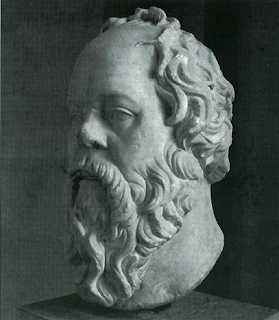Did Jesus Exist? It Doesn't Really Matter
 |
| Photo by Magda Ehlers |
Some people question whether Jesus of Nazareth really existed. Skeptics note that the ancient evidence about Jesus is third-hand, sketchy, and biased.
We may summarize this criticism quickly: First, Paul, the oldest witness, never even met Jesus. Second, the gospels were compiled late. Third, Jesus remained unmentioned outside his cult for almost a century. Jesus, the skeptics say, is just a myth.
One wonders, however, myth or man, does it really matter? Rather than trying to prove a negative, we can argue something less slippery but equally startling and more convincing. Namely: the Jesus who has come down to us is little more than a character sketched by his disciples, and we do not know what he taught.
The following article compares the evidence about Jesus to the evidence about two other ancient, revered teachers: Pythagoras and Socrates. People don't wonder whether Pythagoras and Socrates existed, yet we don't know what they taught, either.1
 |
| Euclid's Graphic Proof of the Pythagorean Theorem[2] |
Today, Pythagoras of Samos is little more than the name we associate with a famous theorem about right triangles. His name has clung to math theorems since around the year -300.
Other than donating his name to mathematics, Pythagoras has pretty much vanished from our school texts. Nothing that he wrote has survived-this even though we still have scraps of writings from other pre-Socratic thinkers.
It is therefore a little surprising to learn that an elaborate cult and mythology centered on Pythagoras for centuries. As with Jesus, we can't tease the real man out of the legends.
J. A. Philip put it nicely: "Ancient sources provide us material ampler than that for any other Greek thinker, but it is only as they become more distant in time from Pythagoras that the accounts grow more precise and more detailed; after a millennium they tell us the composition of the cakes that were his principal sustenance.
According to the oldest surviving biographies of Pythagoras, he grew up in the -500s on the island of Samos, off the west coast of what is now Turkey.
As Persia came to dominate the area, he moved to the Greek colonies in Italy, where he meddled in local politics. His faction was slaughtered toward the end of the century, and only a couple of his followers escaped alive.
These are the spare facts of his life. Three other pre-Socratic philosophers mention him, the sum total of ancient evidence close to his own time. One of these philosophers, Heraclitus, scorned Pythagoras, "Much learning does not teach sense; otherwise it would have taught Hesiod and Pythagoras, and again Xenophanes and Hecataeus."
Heraclitus was a contemporary of Pythagoras. Xenophanes, another contemporary scorned by Heraclitus, said that Pythagoras believed in reincarnation: "And once when he passed a puppy that was being whipped they say he took pity on it and made this remark: 'Stop, do not beat it; for it is the soul of a dear friend-I recognized it when I heard the voice."
A generation later, a third pre-Socratic, Empedocles, confirmed that Pythagoras believed in reincarnation. That's it. That is all we know about Pythagoras' teaching.4 Legends collected around him after his death, however. By the early -300s, a faction of Pythagoreans appeared.
To them, he became a sort of patron saint of mathematics and strict diet. By the end of that century, theorems were being attributed to Pythagoras himself Both Plato and Aristotle mention the Pythagoreans.
Among the odd facts, we learn that Pythagoreans did not eat beans-this according to a lost treatise on the Pythagoreans, written by Aristotle.
Aristotle also traced Plato's number mysticism to the Italian Pythagoreans: ''After the philosophies named came to the enterprise of Plato, which in many ways followed them, but went its own way, diverging from the philosophy of the Italians."
Over the following centuries, Platonic and Pythagorean teachings fused further.5 By the late -300s, biographies of Pythagoras were written. Though lost today, these works were mined by later biographies written five to six hundred years afterward.
The later biographies have survived. In these accounts, the real man recedes, replaced by a demigod. The demi-god Pythagoras traced his lineage of reincarnations back to the Trojan War. He had a golden thigh. He commanded animals, controlled storms, calmed seas, and predicted earthquakes.
The cult of Pythagoras and his reincarnations grew. Revered as his avatars, men like Apollonius of Tyana and Alexander Abnoteichus became famous. Apollonius attracts our special attention because a revived, minor cult centers on him to this day, as a quick internet search confirms.
According to his biography, Apollonius lived during the first century, performed miracles, healed the sick, and raised the dead, inspiring Edward Gibbon's quip, ''Apollonius of Tyana was born about the same time as Jesus Christ.
His life (that of the former) is related in so fabulous a manner by his disciples, that we are at a loss to discover whether he was a sage, an impostor, or a fanatic."6
Given this mass of written material, we can pose the same questions about Pythagoras which we ask about Jesus: Did he exist? I would say yes, the third-hand contemporary witness satisfies me. But do we know what he taught?
No, I would say we know nothing about his teaching other than his belief in reincarnation. Today Pythagoras is little more than the name of a theorem and a colorful character in biographies written down seven hundred years after his death.7
 |
| Bust of Socrates, Louvre MA 59[8] |
Conventionally, we lump Pythagoras together with the pre-Socratics. They were early Greek thinkers who proposed mechanical models of nature. Socrates of Athens came later, during the -400s.
Although we know little about the lives of the pre-Socratics, fragments of their writings have survived. The reverse is true of Socrates. We know a fair amount about his biography.
However, because he never wrote down his thoughts, we don't know what he actually taught. Three major contemporary accounts of Socrates have come down to us: Aristophanes' lampoon and memoirs by his students Xenophon and Plato.9
The contemporary sources agree that Socrates looked like a satyr. Apparently, he also heard an inner voice, which advised him. He desired boys erotically.
 |
| Arch of Titus (Rome): The Spoils of Jerusalem[14] |
He criticized democracy. Ultimately, the sources continue, Athens executed him for impiety and for corrupting youth. In short, he was an ugly, schizoidal pederast who mocked democracy. What, however, did he teach other than skepticism about democracy?
Unfortunately, our three major sources disagree here.10 In Aristophanes' broad comedy The Clouds, Socrates appeared as a huckster who peddled debating skills.
Socrates taught his pupils how to argue so persuasively that they could make right seem wrong and vice-versa. Apparently, this view of Socrates was widespread. He had to refute it at his trial. In contrast, Socrates' student Xenophon sketched a nicer portrait.
For Xenophon, Socrates was a kindly old man who gave sensible advice. This is how Socrates appeared in Xenophon's Memoirs and in his treatise on Household Management.
Xenophon, an anti-intellectual soldier, portrayed Socrates as a fellow anti-intellectual, someone who fawned on diviners and rejected science.11
Plato, poet, academic, intellectual, disagreed. In Plato's early dialogs, Socrates appeared as the ultimate intellectual, an annoying quibbler who ridiculed his pupils' opinions and denied that he knew anything himself.
Plato's Socrates said that you should not hurt even your enemies-but Xenophon's Socrates taught the opposite. Plato's Socrates did not believe in luck-but Xenophon's Socrates did. Did Plato lie? Did Xenophon lie?
Alternatively, did Socrates teach Plato one thing and Xenophon another? Because Socrates left no writings, we can believe whatever we want.12 Plato's known works survive almost intact. This sets him apart from most other ancient philosophers, whose writings come down to us only in pieces.
Due to the sheer volume of Plato's witness, his memory of Socrates tends to frame later accounts. Plato's memoirs of the trial and death of Socrates created a sort of literary type of the wise man unjustly executed for quarreling with his neighbors.
The later Passion narratives echoed Plato's Euthyphro, Apology, Crito, and Phaedo dialogs: The wise man could have escaped but, instead, he calmly accepted his legal sentence. In the end, even his guard realized how righteous the just man was. And so on.13
A half-century passed between Pythagoras and Socrates. Another four centuries passed between Socrates and Jesus. As with Pythagoras and Socrates, we know a bit about the biography of Jesus. Unfortunately, we don't know what he taught because Jesus, too, left no writings.
Our closest source, Paul's fragmentary letters, is thirdhand. Paul met disciples of Jesus but not Jesus himself Here's what Paul tells us: Jesus had brothers, including one named James, whom Paul met. Jesus had twelve disciples. Jesus was crucified.
That's all Paul tells us about the biography of his hero. Even more frustratingly, Paul tells us practically nothing about what Jesus taught. Paul preserved only two of his hero's teachings: 1) Jesus forbade divorce, and 2) Jesus said preachers should be paid.
That, again, is it.15
The gospels are our other ancient sources for the life and teachings of Jesus. Unfortunately, they are anonymous works. Later convention ascribed them to four disciples of Jesus. However, none of the gospel writers claims to have met Jesus.
Only one of the gospels (John) claims to be based on a written, eye-witness account. Various plausible models date these works a couple generations after the time of Jesus. Some of these models turn on one or two short quotes. One scholar may consider the part of the quote of the original gospel, while another scholar may consider them later forgeries.
For instance, the splitting of the temple wall-a wink at the destruction of Herod's temple----can be seen as evidence that Mark wrote his gospel after general Titus razed Jerusalem in the year 70.
However, it is also plausible that a later scribe added this nice detail to Mark's gospel after Jerusalem's destruction but before Matthew and Luke supposedly cribbed Mark's account. Some models do not rely on stray quotes but rather on broad themes in the gospels.
It is supposed that mere scribes would not invent or sustain broad themes. One such attractive model dates the gospels long after Paul, based on the following systemic evidence: A strong anti-jewish polemic pervades the gospels but not Paul's letters.
This model rests on the plausible theory that over time Jews and Christians grew further apart and became mutually hostile. But this begs the question. How do we know that some Christian congregations weren't stridently anti-jewish from the start?
In short, a stable consensus has not formed around any of these theories. We can say this: myth, magic, and miracle heavily marble the gospels. The authors did not bother to separate fact from fiction. So how, nineteen centuries later, can we?
Again, various plausible models have been put forward for sifting the real teachings of Jesus out of the inventions. And again, no stable, critical consensus has formed around any of these models yet. As with Pythagoras and Socrates, we can believe whatever we need to.16
In the end, what can we say about these three teachers, the historical Pythagoras, the historical Socrates, and the historical Jesus?
Not much. None of these men left any writings. We can say when they lived but we have contemporary evidence only for a handful of their teachings.
For Socrates, the evidence is strongest, but even that is second-hand and contradictory. For Pythagoras and Jesus, the evidence is third-hand at best. Who were these men? We don't know. The men themselves recede from history, replaced by colorful characters in the stories their followers wrote.17 *
Read next:
━━━━━━━━━━━━━━━━━━━━━━━━━━━━━━━━━━━━━━━━━━━━━━━━━━━
By Rick Hillegas
Hillegas has been an outspoken Atheist for more than three decades. In his spare time, he reads ancient literature. In his professional life, Rick was an early contributor to Derby, the Apache Foundation's open-source computer database
Footnotes
- For a good summary of arguments against the existence of Jesus, see Jim Walker's web page [Internet: http://nobeliefs.com/exist.htm]
- Graphic copyrighted by Wolfram Research Inc. See [Ibid.: http://mathworld. wolfram.com/Pythagorean Theorem.html].
- Concerning the attribution of the famous theorem, see [Heath 1981 1: 143]. That Pythagoras left no writings, see [Barnes 1987: 81], [Guthrie 1987: 19], and [Philip 1968: 193]. The quote is from [Ibid.: 3]
- See [Guthrie 1987] for translations of the biographies of Pythagoras written by Diogenes Laertius, Porphyry, and Iamblichus. The quotes come from the Diogenes Laertius biography and are translated and discussed in [Barnes 1987: 81-88].
- [Barnes 1987: 81-88]. [5J On Plato's references to the Pythagoreans, see [Philip 1968: 10]. On Diogenes Laertius' references to Aristotle's lost treatise, see [Guthrie 1987: 149]. On Aristotle's comparison of Plato and the Pythagoreans, see [Philip 1968: 10] and [Ibid.: 77]. For a translation of the quote from Aristotle (Metaphysics 987a 29), see [Hope 1999: 19]. On the fusing of Platonism and Pythagorean ism, see [Guthrie 1987: 38]
- On Heraclides as the source of the biographies of Pythagoras, see [Philip 1968: 12-13]. On Apollonius as a reincarnation of Pythagoras, see [Ibid.: 17]. On Alexander Abnoteichus as a reincarnation of Pythagoras, see [Costa 2005: 142-143]. For Gibbon's quip, see [Gibbon 1788 1: 264], footnote 63.
- See [Philip 1968 1 for a critical survey of the surviving evidence on Pythagoras
- Photo copyright Amy C. Smith. See [Internet: http://www.stoa.org/projectsldemosl article_portraits?page= 12&greekEncoding= UnicodeC] .
- On the major sources for Socrates, see [Saunders 1986: 20] and [Saunders 1987: 16-19].
- [Internet: http://www.stoa.org/projects/ demos/article_portraits?page= 12 &greekEncoding= UnicodeC] surveys ancient references to the appearance of Socrates. On his ugliness, see in particular [Waterfield 1987: 17] and [Tredennick 1990: 242, 253]. For surveys of ancient references to Socrates' inner voice, see [Saunders 1987: 318] and [Tredennick 1990: 34-35]. On his pederasty, see for instance [Hamilton 1971: 75, 95]' [Tredennick 1993: xxiii], [Guthrie 1956: 38, 46], [Ibid.: 122], [Waterfield 1982: 76, 125], and Xenophon [Tredennick 1990: 222, 260, 262- 263]. For a survey of references to his attitude toward democracy, see [Saunders 1987: 34]. On the death of Socrates, see the accounts by Plato and Xenophon in [Tredennick 1993] and [Tredennick 1990 ].
- For a translation of The Clouds, see [Sommerstein 1973 ]. On refuting the charge, see the accounts of Socrates' death mentioned above. On Socrates as an anti-intellectual, see [Tredennick 1990: 212-213].
- Hugh Tredennick and Robin Waterfield have contrasted Plato and Xenophon's accounts. See the introduction to [Ibid. ] for a good survey of how the accounts differ.
- On Socrates' acceptance of his legal sentence, see [Tredennick 1993: 62- 63]. On the epiphany of his guard, see [Ibid.: 183].
- Graphic from [Internet: http://atheism.about.comllibrary/FAQs/christian/blxtn_jerusalem-titus03.htm].
- On Paul's meeting people who knew Jesus, see [Marxsen 1968: 18] and Galatians 1.18-20. On Paul's biography of Jesus, see [Ehrman 1997: 189- 190]. On the dominical sayings, see[Collins 1983: 5-6] On forbidding divorce, see Corinthians 1.7.10-11. On paying preachers, see Corinthians 1.9.14
- On Pappias' ascription of the first gospel to Matthew, see [Marxsen 1968: 152]. On Pappias' ascription of the second gospel to Mark, see [Ibid.: 142]. On Irenaeus' ascription of the third gospel to Luke, see [Ibid.: 161]. On Irenaeus' ascription of the fourth gospel to John, see [Ibid.: 259]. On splitting the temple wall, see Mark 15.38, Matthew 27.51, and Luke 23.45. On John's written source, see [Ehrman 1997: 152-153] and John 21.24.
- For a critical treatment of the Pythagorean sources, see in particular [Philip 1968 ]. For a critical comparison of Plato and Xenophon's sketches of Socrates, see [Tredennick 1990 ]. For a critical treatment of the early Christian sources, see [Marxsen 1968 ].
Bibliography
- [Barnes 1987] Jonathan Barnes. Penguin Books. 1987. Early Greek Philosophy
- [Collins 1983] Raymond F. Collins. Doubleday and Company, Inc .. 1983. Introduction to the New Testament
- [Costa 2005] Lucian, tr. Desmond Costa. Oxford University Press. 2005. Lucian: Selected Dialogues
- [Dodd 1970] ed. C. H. Dodd. Oxford University Press. 1970. The New English Bible with the Apocrypha
- [Ehrman 1997] Bart D. Ehrman. Oxford University Press. 1997. The New Testament: A Historical Introduction to the Early Christian Writings
- [Gibbon 1788 1] Edward Gibbon. Modern Library. 1788. The Decline and Fall of the Roman Empire, Vol. 1
- [Guthrie 1956] Plato, tr. W. K. C. Guthrie. Penguin Books. 1956. Protagoras and Meno
- [Guthrie 1987] tr. Kenneth Sylvan Guthrie, tr. Thomas Taylor, tr. Arthur Fairbanks. Phanes Press. 1987. The Pythagorean Sourcebook and Library: An Anthology of Ancient Writings Which Relate to Pythagoras and Pythagorean Philosophy
- [Hamilton 1971] Plato, tr. Walter Hamilton. Penguin Books. 1971. Gorgias
- [Heath 1981 1] Thomas Heath. Dover Publications, Inc .. 1981. A History of Greek Mathematics, Volume I
- [Hope 1999] Aristotle, tr. Richard Hope. The University of Michigan Press. 1999. Metaphysics
- [Internet] Various. Various. 1989. Internet pages
- [Marxsen 1968] W. Marxsen, tr. G. Buswell. Basil Blackwell. 1968. Introduction to the New Testament
- [Philip 1968] J. A. Philip. University of Toronto Press. 1968. Pythagoras and Early Pythagoreanism
- [Saunders 1986] Plato, tr. Trevor]. Saunders. Penguin Books. 1986. The Laws
- [Saunders 1987] Plato, tr. Trevor]. Saunders, tr. lain Lane, tr. Donald Watt, tr. Robin Waterfield. Penguin Books. 1987. Early Socratic Dialogues
- [Sommerstein 1973] Aristophanes, tr. Alan. H. Sommerstein. Penguin Books. 1973. The Acharnians, The Clouds, Lysistrata
- [Tredennick 1990] Xenophon, tr. Hugh Tredennick, Robin Waterfield. Penguin. 1990. Conversations of Socrates
- [Tredennick 1993] Plato, tr. Hugh Tredennick and Harold Tarrant. Penguin Books. 1993. The Last Days of Socrates
- [Waterfield 1982] Plato, tr. Robin A. H. Waterfield. Penguin Books. 1982. Philebus
- [Waterfield 1987] Plato, tr. Robin A. H. Waterfield. Penguin Books. 1987. Theaetetus


The difference is that Socrates and the others didn't preach hell fire if we don't believe them. So who cares if they existed or their writings are authentic. We can sift though and keep any knowledge or wisdom gleaned.
ReplyDelete